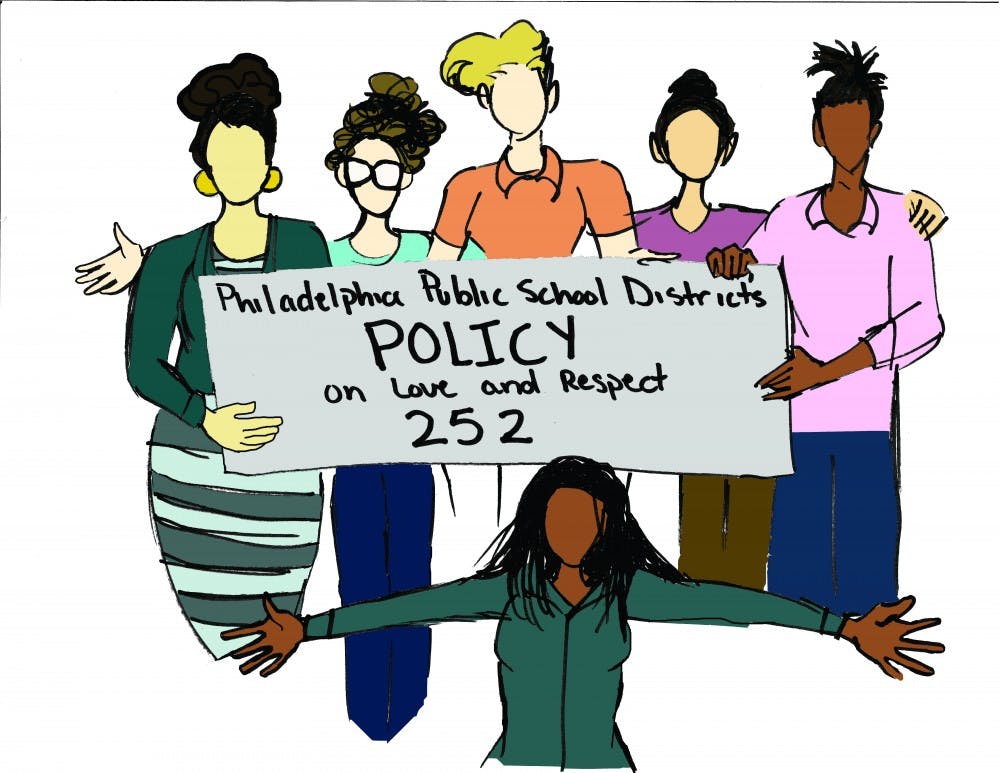
Professor Amy Hillier decided to take on this project after experiencing the policy's workings firsthand as the parent of a trans daughter in the School District of Philadelphia.
Credit: Photo from Amy HillierPenn professor Amy Hillier worked with LGBTQ students in Philadelphia to reform the School District of Philadelphia’s policy to accommodate transgender and gender nonconforming students.
Policy 252, which went into effect this past June, protects transgender and non-binary students from discrimination based on gender identity and establishes specific guidelines for pronoun usage and gender neutrality in the classroom. Hillier is currently working on compiling data on the policy to evaluate its effectiveness and the impact 252 has on youth in the school system.
The policy was designed in compliance with other Philadelphia school district and federal education laws regarding bullying, harassment, and discrimination. It states that schools should adopt gender neutral language as the norm in all documents and written correspondence with students, regardless of their gender identity or sexual orientation. The policy calls for the reduction, if not elimination, of the practice of “segregating students by gender” in classes — such as physical education — and allows students to be included in the group that corresponds to their gender identity. The policy also outlines guidelines for gender neutral bathrooms and changing spaces, dress codes and gendered uniforms, and athletic teams.
Hillier first became involved as a mother concerned for the rights and treatment of her trans daughter, who is currently enrolled in a public school within the School District of Philadelphia. Hillier said that while the school her daughter attends is “supportive,” there are things that the school would push back on — such as using her daughter’s name and gender from her birth certificate on automated calls and documents from the school district — due to “policy.”
“The school has been very supportive, but there are some things that they couldn’t do because of the district policy — or the lack of a district policy,” Hillier said. “So I went to the school district and said, ‘Hey, its a problem for my kid, its probably problem for other kids too.’”
Hillier said that she wanted to use her “privilege as a white, Ph.D., professor at Penn” to bolster support for the policy and change the way that the entire public school system treats all LGBTQ students, especially low-income students of color who she said face greater struggles.
Kel Kroehle, a 2010 graduate from the School of Social Policy and Practice, also wanted to use their education and ties to the LGBTQ community at Penn to give student voices a platform to be heard.
“Institutions respond to institutions,” Kroehle said. “The policy didn’t come out of nowhere, we just needed a platform to push it...part of which came from Penn”
Kroehle was integral in gathering a group of young people to speak with school district administrators. Kroehle, who uses they and them pronouns, linked their work at the Attic Youth Center for LGBTQ youth with their projects at Penn involving gender studies and the role of gender in education.
Kroehle and Hillier sifted through models of reformed school policies from around the nation to “break apart and rebuild” concepts that they wanted to include in the new Philadelphia policy. Both Kroehle and Hillier wanted to ensure that the students had a role in writing and deciding the new policy.
Hazel Edwards, a student educator at the Attic, worked with Hillier and Kroehle throughout the process, drawing on her private high school experience to ensure that all of the accommodations given to her were standard practice for other LGBTQ students.
Another thing Edwards was determined to eliminate with 252 was the notion of “adultism,” or the feeling of superiority that adults have over children, that she thinks LGBTQ youth face when dealing with administrators and institutions.
“There is the belief that adults have all the answers,” Edwards said. “But youth understand gender, they know what it means ... and challenge what gender looks like.”
Kroehle seconded the sentiment, highlighting the importance that the youth perspective played in the creation of 252 and in the LGBTQ community at large.
“Young people’s wisdom is oftentimes more readily available and liberal because they haven’t been broken down by ... institutions yet,” Kroehle said. “Not only did [the youth] have immediate and relevant insight based on experience, but ... they would plug in humor remembering the spirit and gorgeousness of being gendered, being trans in the dryness of policy.”
The Daily Pennsylvanian is an independent, student-run newspaper. Please consider making a donation to support the coverage that shapes the University. Your generosity ensures a future of strong journalism at Penn.
Donate







